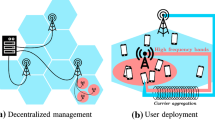Abstract
For high speed mobile communication applications, the data rate can be increased by using multiple channels (or time slots) instead of one channel. To reduce the high blocking rate of multiple channels assignment, flexible resource allocation strategies have been proposed. This paper proposes the Equal Resource Sharing Allocation scheme (ERSA scheme) for flexible resource allocation. The ERSA scheme dynamically averages the allocated resource to the call requests based on the number of calls in a base station. The scheme accommodates the maximum number of requests while providing acceptable quality to the admitted requests. We developed an analytic model to investigate the performance of ERSA, and conducted simulation experiments to validate the analytic model. We define satisfaction indication SI as the performance measurement of the resource allocation algorithm. The experiment results indicate that the ERSA scheme outperforms other resource allocation algorithms proposed in our previous study.
Similar content being viewed by others
References
D. Gross and C.M. Harris, Fundamentals of Queueing Theory(Wiley, New York, 1985).
D. Hong and S.S. Rappaport, Traffic model and performance analysis for cellular mobile telephone systems with prioritized and noprotection handoff procedure, IEEE Trans. Vehicular Technol. 35(3) (August 1986).
J.-Y. Jeng, Y.-B. Lin and W. Chen, Dynamic channel assignment strategies for wireless ATM, Information Sciences 109 (1998) 211–225.
J.-Y. Jeng, C.-W. Lin and Y.-B. Lin, Dynamic resource scheduling for GSM data services, IEICE Trans. Commun. 80-B(2) (February 1997).
Y.-B. Lin, Reducing location update cost in a PCS network, IEEE/ACM Trans. Networking 5(1) (1997) 25–33.
Y.-B. Lin and I. Chlamtac, Effective call holding time for a PCS network, in: IEEE PIMRC '96.
[7] Y.-B. Lin and V.K. Mak, Eliminating the boundary effect of a large scale personal communication service network simulation, ACM Trans. Modeling Comput. Simulation 4(2) (1994).
Y.-B. Lin, S. Mohan and A. Noerpel, Queueing priority channel assignment strategies for handoff and initial access for a PCS network, IEEE Trans. Vehicular Technol. 43(3) (1994) 704–712.
Y.-B. Lin, A. Noerpel and D. Harasty, The sub-rating channel assignment strategy for PCS handoffs, IEEE Trans. Vehicular Technol.45(1) (February 1996).
S.M. Ross, Stochastic Process(Wiley, New York, 1983).
S. Tekinary and B. Jabbari, A measurement based prioritized scheme for handovers in cellular and microcellular networks, IEEE J. Selected Areas Commun. (October 1992) 1343–1350.
E.J. Watson, Laplace Transforms and Applications(Birkh¨auser, Basel, 1981).
Author information
Authors and Affiliations
Rights and permissions
About this article
Cite this article
Jeng, JY., Lin, YB. Equal resource sharing scheduling for PCS data services. Wireless Networks 5, 41–55 (1999). https://doi.org/10.1023/A:1019109902547
Issue Date:
DOI: https://doi.org/10.1023/A:1019109902547




